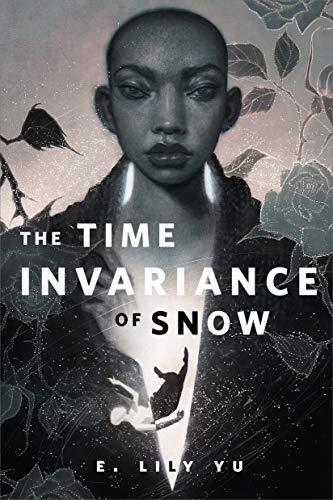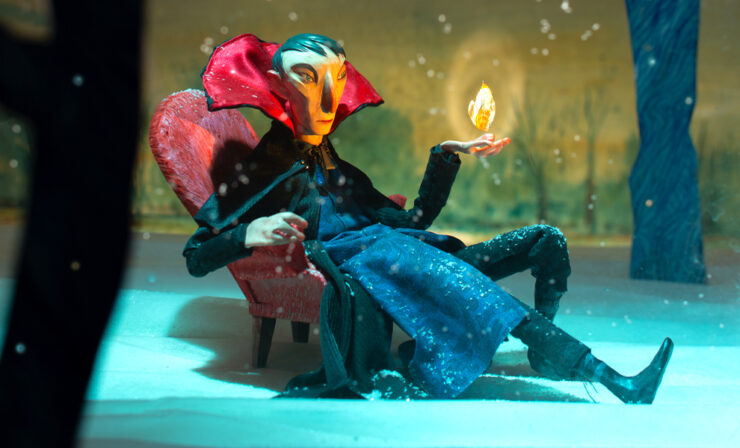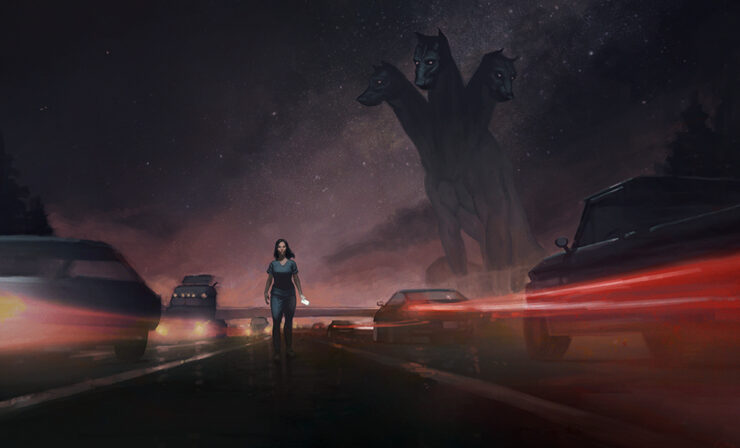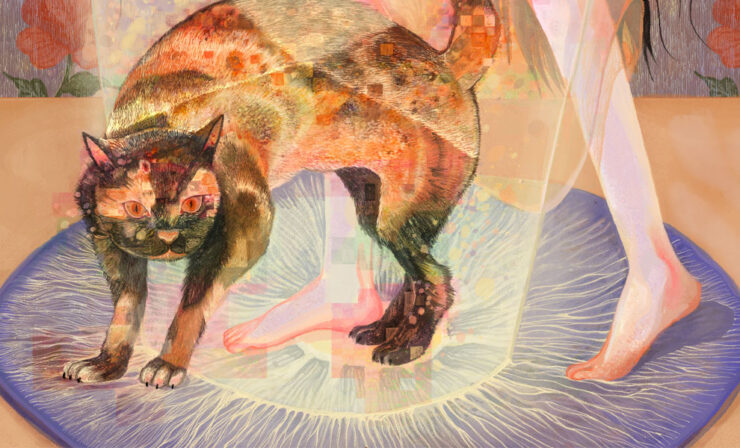The Devil made a mirror. A physicist broke it and shards fell through reality and changed everything forever.
1. The Devil and the Physicist
Once, the Devil made a mirror, for the Devil was vain. This mirror showed certain people to be twice as large and twice as powerful and six times as good and kind as they truly were; and others it showed at a tenth their stature, with all their shining qualities smutched and sooted, so that if one glimpsed them in the Devil’s mirror, one would think them worthless and contemptible indeed.
The Devil looked into his mirror and admired himself, and all his demons preened and swaggered and admired him too. And joy resounded throughout the vaults of Hell.
Eventually there came a physicist who, with radioactive cobalt and cerium magnesium nitrate crystals, sought to test the invariance of symmetry; namely, whether in a mirror universe the laws of physics would be reflected. As she touched and tested the mystery of the world and proved that symmetry did not hold, and that parity was not in fact conserved, she broke, all unknowing, the Devil’s mirror.
Buy the Book


The Time Invariance of Snow
Like the fundamental equations of quantum mechanics, like God Himself, the Devil is a time-invariant equation. The shattering of the mirror shivered outward through fields of light cones, near and far, until the shattering itself became eternal, immutable fact. The fragments of the mirror drifted down through pasts, presents, and futures, clinging and cutting, like stardust and razors.
Whoever blinked a sliver of the mirror into his eye saw the world distorted ever after. Some observed that they were far worthier and more deserving than others, and pleased with this understanding, went forth and took whatever they wished, whether wives or slaves, land or empires.
Some looked at themselves and saw worthlessness. At that sight, whatever pyrotechnic wonders they dreamed died in secret within them.
Others, of particular sensitivity, felt the presence of the glass, which a slow and uncertain part of their souls insisted had not been there before. A few of these tried gouging it out with knives, though it was not a physical construct and could not be thus dislodged. A very few made fine and fragile spectacles for the soul, to correct its sight, and walked long in clarity and loneliness thereafter.
This is how the devil’s mirror worked:
A woman warned a city of its destruction, of soldiers creeping in by craft, and her friends and family laughed her mad.
The city burned.
The woman was raped, and raped again, and murdered.
A woman stood before men who would become consuls and said, believe me, I was forced by this man. To be believed, she struck her own heart with a dagger.
A woman stood before senators and said, believe me, I was—
A woman stood before senators and said, believe—
A black woman said, listen, and no one heard.
A dusky child cried, and no one comforted him.
An indifferent cartographer divided other people’s countries into everlasting wars.
The physicist died. Her male colleagues received a Nobel Prize.
The Devil looked upon his work and laughed.
2. K. and G.
It was summer, and the roses swam with scent. K. had tamed G. with intermittent kindness, as boys tame foxes to their hand, though she had been watchful and wary, knowing the violence of men. Now G. rested her head against K.’s shoulder, and they breathed the soft, sweet air together with the laziness that only summer knows. The two of them were not young; neither were they old.
If I were going to murder you, K. said musingly, I would tie you up while you slept, nail you into a splintery box, and shove the box out of a car going seventy into the path of a truck. The splinters would be driven into your body on impact.
G. was silent for a long time.
At last she said: When you described murdering me—
Yes?
I felt afraid.
K. said: I was joking.
G. said: Still, I was afraid.
K. said: I had good intentions. What on earth do you want?
G. said: Just for you to say you’re sorry.
I can’t believe you’re blowing this up into such a huge deal.
You know about—
Well, I’m sorry that women are sometimes harmed by men. But this is insane.
That’s the glass talking.
What?
The sliver of glass in your eyes and in mine.
K. pushed back his chair so hard it tipped over.
We both contributed to this situation. You have to be more patient and kinder to me.
G. said: I can’t.
Fine, K. said, stamping his foot. A breath of winter blew across them both. The rosebush’s leaves crisped and silvered with frost, and its full-blown flowers blackened and bowed.
I’m leaving, K. said. There was ice in his voice.
G. said: I know what will happen. I will follow you down a stream and into a witch’s house, into a palace, and then into a dark robber’s wood, and in the end I will walk barefoot through the bitter snow into a frozen hall, to find you moving ice upon the pool that they call the Mirror of Reason.
I will come thinking to rescue you. That my tears will wash the glass from your eye and melt the ice in your heart. That the Snow Queen’s spell will break, and you will be free.
But when I arrive I will find no Snow Queen, no enchantment, no wicked, beautiful woman who stole you away.
Only you.
You, who choose cold falseness over true life.
I know, because I am no longer a child and have walked down this road.
I will not go.
She said these words to the summer air, but no one was around to hear.
3. The Ravens
The prince and princess, king and queen now, were not at home. The tame ravens in the palace had long since died.
None of the ravens in the old wood knew her. They rattled and croaked as G. went by.
Imposter!
Pretender!
Usurper!
Slut!
Unwanted!
Abandoned!
Discarded!
Die!
Oh, be quiet, G. said, and continued on her way.
4. The Robber Queen
You’re back, the robber queen said, testing the point of her letter opener against her desk. Didn’t think I’d see you again.
Didn’t you get my postcards? G. said, sitting.
The office was darker than she remembered, for all that they were on the hundredth floor. Outside, other buildings pressed close, like trees.
You know I screen my mail.
I know couriers and postal workers wouldn’t dare to stop here.
The robber queen said: I’m good at my job.
So I’ve heard. I’m proud to have known you when.
Spill, the robber queen said, or I’ll tickle your neck with my dagger for old times’ sake. Is this one handsome, at least? Because the last one—ugh. Does he cook? Does he clean? Please tell me this one, this time, is worthy of you. Tea or whiskey?
Theodora, G. said, you’re so laughing and fierce. How do you do it?
Love ’em, leave ’em. Sometimes I even leave them alive. But once you taste a man’s still-beating heart—
Forget him, G. said.
So there is a him.
A mistake. But I’m not here about that. I’m here to ask for a job.
This isn’t the United Nations, G. We do dirty, filthy, bloody work. That I’ll be hanged for, if I’m ever caught.
You have power, G. said. I don’t know what that’s like. To hold a knife, with another person’s life on its edge. Teach me.
Mine is a raw and common power, the robber queen said. What you have is greater.
I have nothing.
Stop, or I’ll cut off your little finger so you’ll never forget. I don’t know how or when you got it. Maybe the crows taught you, or the Lap women. Your eyes see to the soul. Your words cut to the bone. Men and women are stripped naked before you. Now, if you’d only use that power, you could hurt those you hate with an unhealing harm. I’d give my three best horses for that.
G. said: No.
Say, such and such is the shape of your soul, though you wear mask upon mask to hide it.
Theodora, G. said, a wolf is the shape of your soul, and there’s blood on its muzzle and mud on its pelt.
It is! And I’ll never hide it.
Are you sure you won’t let me rob one company? Just for the experience?
This is an investment firm, not a charity. Speaking of which, I’ll be billing you for my time. Must keep the numbers regular.
Someday when I have money, I’ll pay you, G. said.
That you will.
5. The Lap Women
Old they were, in appearance far older than time: their eyes seams of stars, their fingers the knurls of ancient oaks. They rocked in their maple rocking chairs, knitting blankets with a pattern of silver fish from a silvery wool. The fish gathered in soft clouds around their feet.
G. said: I’m sorry I haven’t visited or called.
They smiled at her and continued to rock. One by one, fish slipped from their needles’ tips.
G. said: I’m sure you have family. Daughters or sons who bring fruit and chocolate. Somebody. You must have somebody.
They continued to rock.
Can I help you? a nursing assistant said.
These are old friends of mine, G. said, blushing as she said it, for years of silence and absence had passed. I came to ask their advice.
Good luck. They haven’t spoken since they checked in. And that was fifteen years ago.
G. said: That long?
Time can jump you like that. Leave you bruised in an alley with no memory at all.
Is there anything they like to do besides knit?
Cards, the assistant said. They’ll skin you in most kinds of poker, and they’re fiends for bridge.
Then I’ll stay and play cards with them, if they wish.
You’ll regret it, the nursing assistant said. But she went and fetched a worn deck anyway.
At the sight of the cards, the three old women jabbed their needles deep into their skeins and rose from their rocking chairs, holding out their hands.
G. proceeded to lose every bill from her wallet, her sweater, the cross on a chain that she wore, and the black glass buttons on the front of her coat.
The eldest Lap woman took her sewing shears and snipped off the buttons, one-two-three-four. Then she picked up the hillocks of silver knitting, finished each fragment, and whipstitched the three clouds of fishes, each cloud a different gray, into a single long shawl. This shawl she draped around G.’s shoulders.
Thank you, G. said. I think.
All three Lap women smiled gentle, faraway smiles.
The nursing assistant scratched her ear.
Are you going somewhere cold? she said.
G. said: Very.
6. The Snow Queen
It was hours and hours until dawn, and the world was a waste and a howling dark.
At some point in the distant past, the sweep of ice beneath G’s feet had been chopped into a stair that wound up and around the glassy mountain. As she climbed, thick snowflakes clung to her lashes. She had the shawl of silver fish wrapped around her for warmth and sensible boots on her feet. She needed no guide, for she knew the way.
Before she left, G. had knelt and prayed as trustingly as she had when she was a child, and now she held that prayer like a weak and guttering taper.
Here was the Snow Queen’s palace: smaller than she remembered, as if her child self’s memories had exaggerated its dimensions, or else whole wings and wards had melted away. Frost blossoms still bloomed from windows and eaves. Crystalline gargoyles crouched in its crenellations.
Collecting her courage, G. pushed the palace gates open. Her hands turned white, then red, with cold.
No one waited inside. No Queen. No K. There was only the vacant throne and the familiar, frozen pool with its shards arranged into the word Eternity.
It was quiet.
Her breath left her lips in glittering clouds.
G. crossed the hall, her steps echoing. The throne might well have been carved from the world’s largest diamond. Like a lily or lotus, it peaked to a point. Rainbows glowed in its fractured depths.
On the throne’s seat was a small crown of silvered glass.
G. picked up the crown and turned it in her hands. In that whole country, it was the only thing that was not cold.
The long glass thorns flashed fragments of her face: a sneer, a glare, a look of contempt.
Of course, G. said.
The jagged edges of her life shone brilliantly before her. In a moment she saw how they could be fitted together to spell out the forgotten word she had pursued all her life, sometimes glimpsing, sometimes approaching, never grasping entire—
One way or another, the Devil’s mirror produces a Snow Queen.
G. raised the crown above her head, admiring how its sharpness shivered the light, how it showed her beautiful and unforgiving.
And then she drove it against the point of the diamond throne.
Across seven dimensions the glass crown cracked and crumbled. Glass thorns drove into G.’s wrists and fingers, flying up to cut her face.
Where the blood beaded and bubbled up, it froze, so that G. wore rubies on her skin, rubies and diamonds brighter than snow.
And the palace too cracked as the Queen’s crown cracked, from top to bottom, like a walnut shell.
All around was darkness.
Down into that darkness G. fell, and time fell also, in fine grains like sand.
7. A Brief Digression on Hans Christen Anderson and the Present State of Physics
Considered as a whole, in all its possible states, the universe is time-invariant. When this insight is worked out and understood at a mathematical level, one both achieves and loses one’s liberty. We are freed from one enchantment, only to be ensorcelled by another. And while the first is a snowy, crowded pond upon whose hard face the whole world may skate and shout, the second is a still and lonely (some say holy) place, where only the brave go, and from whence only the mad return.
Those who reach the latter place understand that it was always the case that they would come here. Perhaps they weep. Perhaps they praise God.
Who knows? And who can say?
8. G. and the Devil
At the end of her fall, G. met the Devil face to face.
He was pretty, in a moneyed way, sharp as polished leather, with a pocket square and black, ambitious eyes.
The Devil said: That’s my mirror you’re wearing in your flesh, in your hair. That’s the mirror that I made. Me.
Why? G. asked, and in that question was all the grief of the world.
The Devil said: Because when one is alone in pain, one seeks to spread suffering, and so be less alone. It’s quite logical.
But why?
When a dark heart gazes upon glory, a glory that the heart can never attain, then the whole being turns to thoughts of destruction.
WHY?
As the Devil continued to speak, his words plausible, his face reasonable, his voice reassuring, scorpions and serpents slid out of his pockets, clinging to each other in thin, squirming chains. And the chains crept and curled and reached for her.
In her hand, however, was the hard hilt of a sword, whose one edge was ruby and the other diamond. On her breast she wore overlapping silver scales. And in her other hand was a buckler burnished to the brightness of a mirror.
If the Devil noticed, he gave no sign.
Tell me the truth, G. said.
He said, Because you are ugly and it was a Tuesday.
G. swung the sword to her left and severed a whip of scorpions, then to her right, bisecting a braid of vipers. Slices of snakeflesh and crunched carapace tumbled around her. Of a sudden the Devil looked not so charming.
You think you can fight me? he said, ten times larger now, and growing, until his smallest curved toenail was the height of her head. His voice was the thunder of ten million men.
G. said: I have seen eternity. I know you have already lost.
And she struck, her sword flashing bloodlight and lightning.
The Devil roared.
9. G. and K.
His hair was white, and he walked with a cane, limping like a crane as it hunts in the reeds.
Her own hair was silver, and her face and hands were scarred.
I’m sorry, he said.
I know you are.
I came all this way to tell you.
I knew you were coming, G said.
You saw me plainly. I couldn’t bear it. I wanted to hurt you, and I did.
G. said: It’s all over now.
It is.
K. squinted at her, as if looking into radiance.
I see you’ve made your glass into a sword.
And you’ve made yours into a door.
A tempering all your life, then. A tempering and a war. As I have lived openings and closings. As I have yielded and withstood.
So you and I have been made of use.
We have, K. said. We have indeed.
Buy the Book


The Time Invariance of Snow
“The Time Invariance of Snow” copyright © 2019 by E. Lily Yu
Art copyright © 2019 by Audrey Benjaminsen














